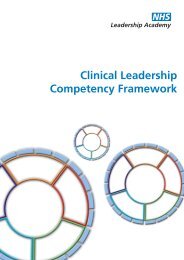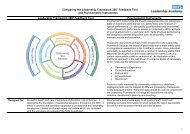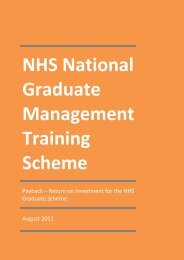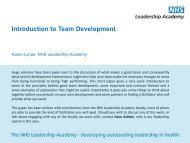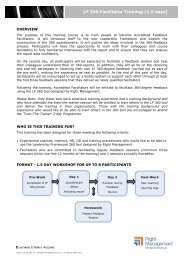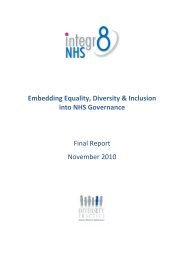Healthy NHS Board: a review of - NHS Leadership Academy
Healthy NHS Board: a review of - NHS Leadership Academy
Healthy NHS Board: a review of - NHS Leadership Academy
Create successful ePaper yourself
Turn your PDF publications into a flip-book with our unique Google optimized e-Paper software.
Research on board engagement, organisational culture<br />
and human resources describe the potential harm <strong>of</strong><br />
stress in the workforce (The King’s Fund, 2012, McKee<br />
et al., 2010). A <strong>review</strong> <strong>of</strong> staff wellbeing recommends<br />
that wellbeing should be championed at board level,<br />
and that strategies should be in place to improve<br />
the health and wellbeing <strong>of</strong> the workforce. These<br />
strategies should be adapted and added to reflect local<br />
workforce need (Boorman, 2009). Research on human<br />
resource management suggests that setting clear goals<br />
that are understood at every organisational level is a<br />
predictor <strong>of</strong> higher patient satisfaction (West et al.,<br />
2010). As mentioned elsewhere (for example Section<br />
3.4), staff wellbeing is associated with quality <strong>of</strong> care<br />
and productivity and can be supported through such<br />
processes as well structured appraisal, suitable staffing<br />
levels, training, particularly when provided within a<br />
patient safety-oriented culture (McKee et al., 2010, West<br />
et al., 2010). This may support a ‘spiral <strong>of</strong> positivity’,<br />
where staff commitment to the organisation is reflected<br />
in patient outcomes and patient satisfaction (West et al.,<br />
2010).<br />
7.7 Culture and dynamics<br />
While board culture and dynamics are increasingly<br />
recognised as important, the related lessons on board<br />
culture and dynamics presented in our original <strong>review</strong><br />
are broadly unchanged.<br />
As described throughout this <strong>review</strong>, board culture has<br />
been a focus <strong>of</strong> recent healthcare guidance and research<br />
(Chambers et al., 2013, Department <strong>of</strong> Health, 2013c,<br />
Francis, 2013).<br />
Features <strong>of</strong> a healthy board culture include high trust<br />
between members (Chambers, 2012) and capacity<br />
to have open and constructive debate (Deffenbaugh,<br />
2012). <strong>Board</strong> members’ emotional intelligence is<br />
identified as important (Chambers et al., 2013,<br />
Cornforth et al., 2010). This may support better<br />
chairing <strong>of</strong> meetings and management <strong>of</strong> relationships<br />
(Cornforth et al., 2010).<br />
A <strong>review</strong> <strong>of</strong> research on engaging boards suggests<br />
that a useful activity in strengthening board culture is<br />
to spend time together away from the boardroom, for<br />
example in terms <strong>of</strong> attending development days, but<br />
also in social settings (Alimo-Metcalfe, 2012).<br />
While the factors that influence how boards make the<br />
decisions they make are clearly important, they are as<br />
yet not well understood. The need for more research,<br />
ideally using observational methods, is identified<br />
(Bennington, 2010, Chambers et al., 2013).<br />
34 The <strong>Healthy</strong> <strong>NHS</strong> <strong>Board</strong>, 2013: Principles for Good Governance



